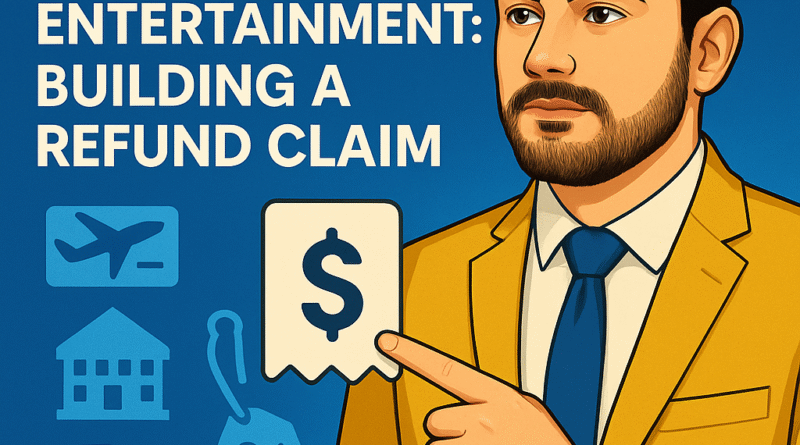Drip Pricing in Travel & Tickets: How to Build a Winning Refund Claim
Context: Drip pricing—the practice of revealing mandatory fees late in the purchase path—has become pervasive in travel (airfare add-ons, bag/seat fees, resort fees, cleaning fees, car-rental add-ons) and entertainment (ticketing service fees, facility charges, order processing fees). In many jurisdictions, advertising a headline price that omits unavoidable fees is considered deceptive. This guide explains how to document a drip-pricing incident and build a refund claim that speaks the regulator’s language and gives you leverage with merchants, platforms, and payment providers.
1) What drip pricing is—and why it matters for refunds
Drip pricing happens when a seller shows a low anchor price early (e.g., “$89 hotel room” or “$45 concert ticket”), but discloses mandatory “fees” only at checkout (e.g., resort, facility, service, or “order processing” fees). Consumers invest time, make plans, and feel locked-in when the total is finally revealed—classic choice architecture that regulators call misleading. If the total, unavoidable price was not shown up-front, you can argue lack of informed consent and seek refunds for the hidden portion, or the whole transaction if the fee was material to your decision.
Key signals of drip pricing
- Headline price excludes a mandatory fee (not a government tax) revealed only at the final step.
- “Fees” labeled vaguely (facility, convenience, destination, service, order processing) with no opt-out.
- Dynamic fees that rise with demand while still unavoidable (e.g., “variable service fee”).
- Platform claims “seller sets the fee” while the seller claims “platform fee”—a responsibility gap.
2) Legal hooks you can use (plain-English overview)
- General unfair/deceptive acts rules (UDAP/UDTPA): most U.S. states prohibit deceptive advertising and omissions of material facts. A price that misses mandatory fees is typically material.
- Air travel: U.S. Department of Transportation (DOT) requires the full fare be advertised (including carrier-imposed mandatory charges) and mandates clear disclosure of optional fees. Significant flight changes/cancellations entitle you to refunds, not just credits.
- Hotels & lodging: federal unfairness/deception standards and state AG actions target “resort/destination fees” that were not included in the advertised price. Many settlements and guidance now expect total price up front.
- Ticketing (live events): state UDAP laws and platform policies increasingly require all-in pricing or a prominent total at the beginning of the flow.
- International: the EU’s Unfair Commercial Practices Directive and Consumer Rights Directive expect transparent, all-in prices; the UK’s CMA and CAP Code police misleading pricing and mandatory fees.
3) Building your refund claim: the evidence pack
Your goal is to make it easy for a support agent, compliance officer, or regulator to see the misrepresentation. Gather these items:
- Screenshots/video of the full checkout path: listing page, seat/room selection, fees page, final payment page.
- Timestamps & URLs: capture date, time, device type, and page addresses.
- Price breakdown: advertised price, added fees, government taxes, and grand total.
- Marketing copy: promos or ads that displayed only the low anchor price.
- Receipts & terms: booking confirmation, fee descriptions, cancellation/refund policy.
- Impact memo (2–4 sentences): why the hidden fee was material (e.g., chose that venue/date because of displayed price; comparable options were skipped).
Pro tip: record a short screen-capture (GIF/MP4). Regulators and card issuers love process evidence, not just final totals.
4) Step-by-step claim playbook (travel & entertainment)
- Classify the sector:
- Airline → use DOT full-fare rules + refund rights for significant changes.
- Hotel/short-term rental → argue UDAP deception + resort/destination fee precedents.
- Ticketing (concerts, sports, theater) → cite UDAP and platform “all-in” policies.
- Car rental → scrutinize add-ons (tolls, facility, concession recovery) that were not in the headline price.
- Compute the delta: total paid – (advertised headline + government taxes). The delta is your reimbursement target if the fee was mandatory and hidden.
- Send a merchant demand referencing rules: keep it calm, factual, with exhibits (screenshots). Ask for refund of hidden fees or full refund if the fee was central to your decision.
- Escalate to platform or brand policy: many platforms (ticketing, OTAs, marketplaces) have all-in or junk fee policies that beat local law; cite their own rules.
- Regulatory complaint (if needed):
- Air travel → file with DOT Aviation Consumer Protection.
- Hotels/tickets/rentals → file with your State Attorney General + federal agencies (FTC in the U.S.) or national consumer bodies abroad.
- Payment dispute (last resort): use your card issuer’s dispute reason codes (misrepresentation or services not as described). Attach the evidence pack.
5) Visuals: how much do fees change the “real” price?
Scenario A — Concert ticket Anchor price: $45.00 Mandatory service fee: $12.00 Facility fee: $ 6.50 Order processing: $ 4.00 Government taxes: $ 3.60 -------------------------------- Total: $71.10 (+58% over anchor) Scenario B — Hotel night Advertised rate: $89.00 Resort/destination fee: $25.00 City tourism fee: $ 4.00 Taxes: $13.35 -------------------------------- Total: $131.35 (+48% over anchor)
6) Template — refund request (use your details)
Subject: Refund of hidden mandatory fees (drip pricing)
Dear [Merchant/Platform],
On [date], I purchased [product/event/stay] shown at [anchor price]. Mandatory fees ([name them]) were disclosed only at checkout, increasing the price by [X%]. Under consumer protection rules requiring transparent, up-front total prices—and your own pricing policy—this constitutes drip pricing.
Attached are screenshots of the full checkout path and my receipt. Please refund the hidden fee amount of [$$] (or cancel and refund in full). If needed, I will escalate to [State AG/FTC/DOT] and my card issuer.
Sincerely, [Name] [Booking/Order #] [Contact]
7) Sector-by-sector angles
Airlines
- Full fare advertising: the total price (base fare + carrier-imposed mandatory charges) must be the prominent price. Optional services (bags, seat selection) require clear disclosure with upfront access to amounts or ranges.
- Refund leverage: if the airline materially changed/canceled the flight and you declined alternatives, you’re owed a cash refund, not just credits. If an optional paid service (e.g., seat, Wi-Fi) wasn’t delivered, request that refund as well.
Hotels & lodging
- Resort/destination fees should be included in the advertised price or presented as part of the total up front. If the fee appeared late or was unavoidable, request its refund.
- Short-term rentals: “cleaning” or “service” fees that were non-optional but appeared at the end are strong candidates for reimbursement.
Ticketing
- Many platforms now allow an all-in toggle or default to total price. If you captured a path without all-in price up front, attach those screenshots and cite the platform’s policy.
- Beware speculative delivery and “transferred later” seating—if services weren’t provided as described, dispute on that basis too.
Car rentals
- Facility/concession recovery fees may be mandatory; if they weren’t included in the first price shown and could not be declined, seek a partial refund.
- Optional add-ons pre-checked by default (insurance packages, toll programs) are fertile ground for misrepresentation disputes.
8) Decision tree — refund pathways
Did you capture the journey (screens/recording)?
├─ No → Reconstruct with confirmation + cached pages; still attempt.
└─ Yes
├─ Merchant resolves within 10 business days? → Case closed.
└─ No
├─ Platform policy supports all-in? → Escalate with evidence pack.
└─ If denied:
├─ Air travel → File DOT complaint; notify airline.
├─ Other sectors → File State AG + federal consumer agency.
└─ Parallel → Card dispute for misrepresentation (attach exhibits).
9) Quick Guide
- Capture evidence of early screens; don’t wait until after checkout.
- Separate taxes (government) from merchant/platform fees (refund target).
- Compute the delta and ask for that amount back—clear, measurable demand wins.
- Cite the right body (DOT for air; consumer protection/AG for hotels, tickets, car rental).
- Use platform rules against the platform—quote their all-in policy.
- Escalate in 10–14 days if ignored; keep everything in writing.
10) FAQ
1) Are government taxes refundable?
Only if the transaction itself is refunded. Your drip-pricing target is typically merchant/platform-imposed fees that were hidden, not taxes mandated by law.
Further reading:
2) What if the fee was disclosed in the T&Cs but not in the price?
Buried disclosures rarely cure a misleading headline price. Regulators expect the total, unavoidable price to be presented up front with equal prominence.
3) I saw an “all-in price” toggle—does that defeat my claim?
Not necessarily. If the default hid the total and pressured you through the funnel, capture the default behavior and argue that the toggle is insufficient.
4) Can I claim a full refund or only the hidden portion?
Start with the hidden portion. If the fee was central to your decision (e.g., price difference vs. alternatives), you can argue for a full refund based on misrepresentation.
5) Does dynamic pricing itself make a claim?
No. Dynamic pricing is legal if transparent. Your claim rests on mandatory fees omitted from the initial price or services not delivered as described.
6) I booked via an OTA/marketplace. Who do I pursue?
Pursue both: the platform (for policy breach) and the underlying provider (for fee ownership). Ask the platform to process the refund directly.
7) Are “resort” and “destination” fees always illegal?
Not always. They become problematic when excluded from the headline price and unavoidable. Many AG settlements require they be included up front.
8) What if I realized the drip after paying but before using the service?
Request cancellation and refund promptly, citing deception. Early notice strengthens your case and preserves card-dispute windows.
9) How long do I have to dispute with my card issuer?
Check your issuer, but typical windows are 60–120 days from the transaction or event date. File sooner with the complete evidence pack.
10) Does this apply outside the U.S.?
Yes. The EU and UK emphasize total price transparency. Use their consumer authorities if the merchant is European, and cite the platform’s global policy.
Technical base (legal sources – English references)
- U.S. Department of Transportation (DOT) advertising and refund rules for air travel (full fare, ancillary fee disclosures; refunds after cancellations/significant changes).
- Federal Trade Commission (FTC) unfair/deceptive acts authority and guidance on “junk fees”/drip pricing in advertising and online interfaces.
- State Attorneys General (UDAP statutes) and settlements regarding hotel resort/destination fees and ticketing disclosures.
- Ticketing and marketplace policies requiring all-in pricing or upfront total disclosure.
- EU: Unfair Commercial Practices Directive; Consumer Rights Directive (total price transparency). UK: CMA pricing practices and CAP Code guidance.
- Payment rules (card-network dispute reason codes) for misrepresentation/services not as described under cardholder agreements and the U.S. Fair Credit Billing Act framework.
Important notice: This guide is educational and does not replace a lawyer. Rules and platform policies evolve and vary by jurisdiction. For a high-value claim or complex itinerary, seek legal advice.
Do you have any questions about this topic?
Join our legal community. Post your question and get guidance from other members.
⚖️ ACCESS GLOBAL FORUM
